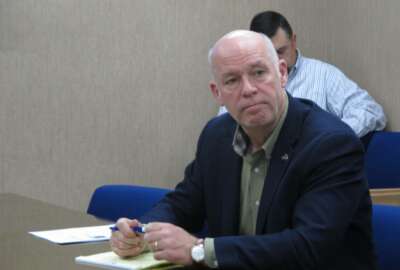
Maybe SBA wasn’t best choice to deliver PPP benefits to minority businesses
For what the landscape looks like for minority-owned businesses, hear from Creative Investment Research's William Michael Cunningham.
Best listening experience is on Chrome, Firefox or Safari. Subscribe to Federal Drive’s daily audio interviews on Apple Podcasts or PodcastOne.
Committed though the government might be too small and minority-owned contractors, from the contractor standpoint making a living is never easy. Now they’ve got the COVID-19 situation. For what the landscape looks like for minority-owned businesses, Federal Drive with Tom Temin turned to Creative Investment Research economist and principal William Michael Cunningham.
Interview transcript:
Tom Temin: Mr. Cunningham, good to have you on.
William Michael Cunningham: Thank you very much, sir. Delighted to be here.
Tom Temin: Now, the pandemic crisis, of course, has hit every business. Has it been worse and more difficult for minority-owned businesses? And if so, what’s going on?
William Michael Cunningham: It has been worse for minority-owned businesses, in part because they always operate with less room for error than non-minority businesses. It’s a question of not having as much capital not having as much access to capital, having issues with respect to getting customers, keeping customers, that sort of thing. So relatively speaking, compared to all businesses, minority-owned businesses are always under capitalized and always, margins are lower. So they have fewer degrees of freedom when a crisis like this hits.
Tom Temin: Of course, relative to say 40, 50 years ago, the range of types of businesses that are under minority ownership is much wider than it was. And you had everything, say, in the federal space from professional services firms, and software development and so forth to traditional types of suppliers. And are there sectoral differences among the strengths of those types of companies?
William Michael Cunningham: There are one of the things that we’ve said is that, you know, if you look across minority businesses, you can identify certain spaces where different groups have a competitive advantage. Let me give an example. So if you go to any federal office building now, you know that the protection duties and a lot of cases have been taken over by security firms that hire these security guards. There are a number of black-owned security guard companies that have done very well, especially with federal contracting over the course of the past 20 years. So I would say that that’s a sector that had some strength. Now, with all of the federal buildings closed, there’s still a need for security guards not as much as it used to have. But it’s still an area where there’s a lot of strengths, specifically for black-owned companies. If you look across the board – and not to be stereotypical, I mean, I’m just a numbers guy. I’m just reviewing the numbers. If you look at some of the other minority groups, let’s say Indians, and I mean, East Asian Indians, they have a very strong presence in IT, and in the computer sector. And, now once again, that sector is going to get hit, it has gotten hit, but they still retain something of a competitive advantage there.
Tom Temin: Sure. And from just looking across the landscape of federal contracting, every year, the numbers come out from the Small Business Administration as to how closely the government came to or maybe exceeded its minority sourcing goals for the year. Does it look healthy from the standpoint of the businesses? Do they feel like they have the shot that all of the laws and regulations layered over these past 40, 50 years have had a positive effect?
William Michael Cunningham: Well, as you know, the federal government has consistently missed its minority and small business goals, in some cases by wide margins. Part of what’s going on, it’s that old “nobody ever got fired for hiring IBM” excuse that you used to hear. A lot of the federal contracts have grown exponentially in size, and they’ve been centralized and the larger firms have been able to grab those very large procurements and keep them within their own network. Now, I will say this, some of those larger firms do a better job than others, of sourcing minority on businesses to participate in some of those ultra large contracts. But it’s still not enough. And this crisis certainly adds pressure to black-owned firms specifically, but to minority firms in general, because of what I just mentioned – the lack of a safety net that those businesses are operating without.
Tom Temin: We’re speaking with William Michael Cunningham. He’s an economist and principal at his firm Creative Investment Research. And let’s talk about the Paycheck Protection Program, the PPP, and that is somehow washing over the economy in fits and starts. What do you feel that minority businesses have had in terms of experience with that, because it’s been hard enough for white-owned businesses, I think to secure the funds they want?
William Michael Cunningham: That’s right. We did a survey that asked minority firms that specifically African American firms about their experience with the PPP program and frankly, the numbers that we got back were a little better than we had initially been expecting. And let me pull up that data and go over them really quickly. It was an article in Black Enterprise where I talked about some of the initial responses that we got. And out of 60% – 60% of the survey respondents for our survey applied to the PPP program. Thirty-three percent of that 60% – and again, I don’t want to be confusing – but 33% got some level of funding. One of the survey respondents noted that they received one 12th of the amount that they asked for. You know, we thought that – and remember, when this program was initially created, the goal was to make sure that the unemployment figures did not shoot through the roof. The unemployment figures have shot through the roof, in part because of that same tendency that we’ve seen with respect to federal contracting. There’s a tendency to really focus on big, big firms and give them the support that these programs offer. When those bigger firms are less in need of those resources. It’s the smaller firms. It’s some micro firms that don’t have the capital access options that big firms do. Those are the ones that really need this PPP program funding, and they’re not getting it. They haven’t been getting it. Hopefully – and, you know, we’ve seen the stories just like everybody else, about certain larger firms. The LA Lakers springs to mind because I’ve been watching that Michael Jordan documentary, returning some of the PPP money they got. That’s fine, but you know, the issue is attitude and timing. I mean, one of the reasons why this kicked off when it did, the PPP program was it was supposed to provide support for these small businesses. And you know, when small business owners see that they are not getting the resources that they need, they start to think about shutting down because they figure they have no other option. So now we’re seeing increased reports of minority firms, small businesses in general, but minority firms and African American firms who are talking about, you know, they might have to shut down. So timing is important, especially with this crisis. We did not see the federal government approach this PPP program in a way that was optimal. You know, I said, I think I’m on record as saying that SBA was the worst agency to assign this program to in toto. Our preferred agency was the Federal Reserve. We thought they would have done a much better job of distributing the capital in a way that would have helped to prevent the spike that you saw, that you’re still seeing in unemployment. It is what it is. That’s water under the bridge. So you just got to deal with what you have now. And again, according to our survey results, black companies, minority companies are getting PPP funding. And, you know, there’s been a big push to engage and involve some of the fintech firms in getting PPP lending to minority on firms. We’ve seen firms like Lendio.com, who we might be partnered with, through our website minorityfinance.com. We’ve seen, speaking of LA Lakers, Magic Johnson, who has partnered with a fintech firm, and is attempting to get about $100 million to minority firms through the PPP program. So I would say that the initial responses were better than we expected in terms of some capital, some funding reaching minority firms. Not as good as it could have been with a more efficient, more effective, a fairer referee: Federal Reserve versus SBA. But an unintended consequence might be that with these additional efforts coming on stream to get capital to minority firms that actually might help to get that capital to those firms. So we’re cautiously optimistic at this point, with respect to the PPP program and getting capital to the firms that really need it.
Tom Temin: Tell me more why you feel the SBA is inferior to the Federal Reserve in being able to conduct potentially this program?
William Michael Cunningham: Well, it’s political. They have made capital allocations – and not just under this administration, but under prior administrations. It’s been my experience, having attempted to work with the SBA for 30 years and being based in Washington, D.C., that there are political headwinds that prevent the agency from being fully effective. They really do have to answer to their political bosses, typically the Executive Branch, and they make capital allocation decisions with that Executive Branch opinion in mind. So their capital allocation decisions are not objective and fully fair, but they’re always colored by some type of political consideration. That’s been my experience over 30 years. And that certainly has affected black-owned companies and minority companies. If you want proof of that, you can Google some of the MSBIC program lawsuits where the SBA over the past 20 years has been sued repeatedly for not allocating capital that was supposed to go to minority firms in a way where the capital went to minority firms. So you have all of this evidence that shows that this is probably not the best agency to use. Again, they can play a role, absolutely. They absolutely have a network. They absolutely have some skills in this area that I think would be useful. But because of the political headwinds that they face the political considerations that are always top of mind for this agency, they weren’t as independent and objective, as I think other entities like the Fed would have been in this situation.
Tom Temin: And do you think the political headwinds from the point of view of SBA were telling them to not allocate funds and capital to minority-owned firms?
William Michael Cunningham: Well, no. I mean, if you look at the PPP program, the evidence is clear. A lot of the supporters of the current administration, were able to jump to the front of the line. That’s documented. That’s clear. I’m not making that up. That’s what I mean. You have a relationship with the administration and suddenly in the middle of the worst economic crisis the country has faced in 100 years, you’re able to get capital to make sure that your business can survive. So that’s what I mean. And once again, I’m just the numbers guy. You know, if you Google it and look it up, you will see story after story of companies that have an affiliation, or support the current administration, who were able to jump the line and get capital very quickly for their firm. So remember, I talked about how timing is important. And time is important in a crisis like this, especially with small business owners. So that makes it doubly important to have an independent and objective capital allocation mechanism and capital allocation institutions. We just haven’t seen that. And we know that there also are issues with the bigger banks. Wells Fargo, the story is clear, with respect to Wells Fargo and some of the issues they’ve had in minority communities. Veterans, other communities you know, not allocating capital in a way that is fair. So you need an independent third party. To me, the Fed fits that bill.
Tom Temin: William Michael Cunningham as an economist and principal at his firm Creative Investment Research. Thanks so much for joining me.
William Michael Cunningham: Thank you very much delighted, to be here and everybody stay safe. Wear your mask, wear your gloves. You know, this isn’t over yet. We’ve got a little bit of a ways to go. But again, I’m optimistic that we’ll all get through this together.
Tom Temin: All right. We’ll post this interview with FederalNewsNetwork.com/FederalDrive. Hear the Federal Drive on demand. Subscribe at Apple Podcasts or Podcastone.
Copyright © 2025 Federal News Network. All rights reserved. This website is not intended for users located within the European Economic Area.
Tom Temin is host of the Federal Drive and has been providing insight on federal technology and management issues for more than 30 years.
Follow @tteminWFED
Related Stories





